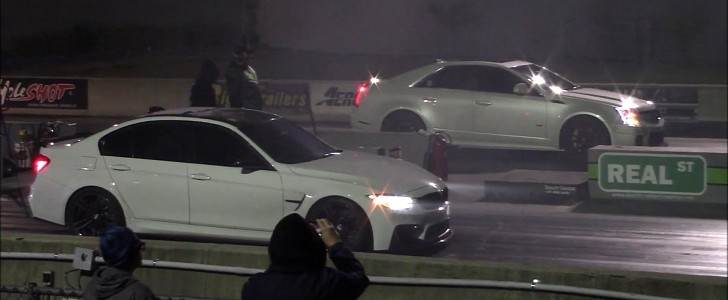The F80 is pretty old news for the BMW community, especially when it comes to exterior styling compared to the 2021 model year G80. Be that as it may, the previous generation of the M3 sports sedan is extremely competent in the right hands and with the right mods.
BMW sets up the F80 for handling rather than neck-breaking launches and straight-line speed, but this M3 is a little different thanks to “a tune.” What kind of tune, the uploader of the following video hasn’t mentioned. In all likelihood, we’re looking at E85 fuel that burns cooler than pump gas.
85 percent ethanol and 15 percent gasoline also translate to roughly 105 octane, which is higher than the recommended rating of 93 and the minimum rating of 91 octane. The Cadillac CTS-V on the other side of the strip is a 2010 model, which means that we’re dealing with 6.2 liters of displacement and a thumpin’ great blower on top of a small-block V8.
General Motors quotes 556 horsepower and 551 pound-feet (747 Nm) of torque at the crank, which is more suck-squeeze-bang-blow than the twin-turbo sixer in the Bimmer with the E85 tune in tow. According to Drag Racing and Car Stuff, the Caddy also rocks aftermarket headers, a ported snout, and a different pulley for the 1.9-liter blower with a twin-screw design.
As such, it’s easy to assume that we’re dealing with more than 600 HP at the crankshaft from this setup. The question is, which of these two four-door sedans will cross the quarter-mile finish line first? Spoiler alert: the F80 needed 10.9 seconds at 127 miles per hour (204 kilometers per hour), while the CTS-V couldn’t do better than 11.1 seconds at 124 mph (200 kph).
The Bavarian challenger made one more pass against a Ford Mustang GT from the S197 generation, and even though the trap speed improved to 128 mph (206 kph), the time dropped to 11.2 seconds due to wheel spin off the line.
85 percent ethanol and 15 percent gasoline also translate to roughly 105 octane, which is higher than the recommended rating of 93 and the minimum rating of 91 octane. The Cadillac CTS-V on the other side of the strip is a 2010 model, which means that we’re dealing with 6.2 liters of displacement and a thumpin’ great blower on top of a small-block V8.
General Motors quotes 556 horsepower and 551 pound-feet (747 Nm) of torque at the crank, which is more suck-squeeze-bang-blow than the twin-turbo sixer in the Bimmer with the E85 tune in tow. According to Drag Racing and Car Stuff, the Caddy also rocks aftermarket headers, a ported snout, and a different pulley for the 1.9-liter blower with a twin-screw design.
As such, it’s easy to assume that we’re dealing with more than 600 HP at the crankshaft from this setup. The question is, which of these two four-door sedans will cross the quarter-mile finish line first? Spoiler alert: the F80 needed 10.9 seconds at 127 miles per hour (204 kilometers per hour), while the CTS-V couldn’t do better than 11.1 seconds at 124 mph (200 kph).
The Bavarian challenger made one more pass against a Ford Mustang GT from the S197 generation, and even though the trap speed improved to 128 mph (206 kph), the time dropped to 11.2 seconds due to wheel spin off the line.







